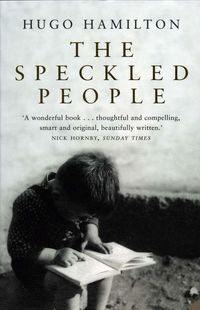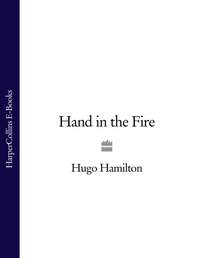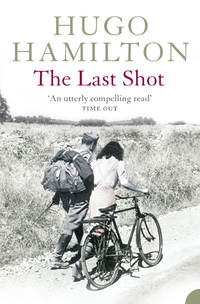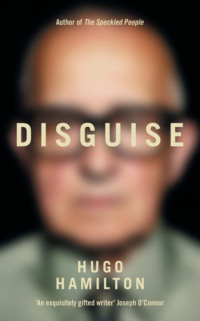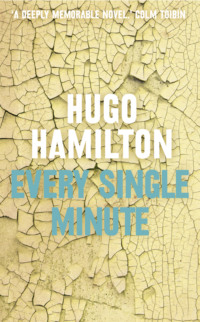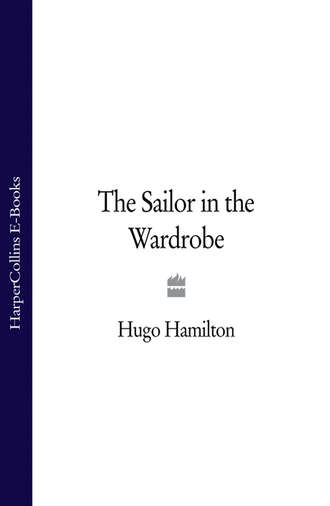
Полная версия
The Sailor in the Wardrobe
It’s a race against time. I know it’s futile because he’s bound to get there before I’m halfway through. No matter how fast I am, he will surely catch me putting away the keys or coming out with my hands behind my back and the disc under my jumper. It’s no good and I turn back. I walk all the way around the table to sit down again and now they’re all wondering why I’m suddenly not in a rush any more. I want to explain that I thought I needed to go to the bathroom and it’s no longer that urgent. But I say nothing. My face has gone red and I feel heavy in my legs. I try to think up other schemes to get out of this. I imagine it’s not happening and that John Lennon will miraculously turn into John McCormack at the last minute, but it’s all hopeless.
Four
At the harbour, everybody has a new identity. It’s the way my friend Packer talks about the place and about the people and about all the things that go on there, the way that he gives everybody a new role, a new life, even sometimes a new name. He has a way of persuading people to do things they never dreamed of. He can make everyone laugh and hold them up with stories. He looks into everyone’s eyes and makes them believe what he’s saying, even as he invents the world around him and turns the most boring day into a big legend, smiling and getting people to agree with his ideas, no matter how mad his latest plans are. When Packer is around, you step outside your own life as if you’re watching yourself in a film, or reading about yourself in a book. He has a gift for making everybody feel like they have been newly invented and that the harbour is a fictional place, out of this world, on a big screen in front of us.
We sit outside the shed listening to Packer talking about Dan Turley, while he’s out in the boat, pulling up the lobster pots. Packer describes all the things nobody even notices about themselves. He talks about how Dan pays us at the end of the week, calling each one of us into the shed individually while the others are not watching, how he pulls a few notes out of his pocket and hands them over secretly with his hand down-turned and shaking a little, as if you’re the only one getting paid. He tells us how Dan gives away nothing about his life, how he trusts nobody and thinks the whole world is a conspiracy against him. Even the sea and the tides are trying to trick Dan Turley. In a low voice, Packer tells us how Dan has enemies at the harbour, how his shed was burned down once and nobody ever found out who did it. Something big is going to happen at the harbour very soon, Packer assures us, and you don’t want to be absent when it does. He says Dan Turley never smiles and often stares at the sea with his eyes narrowed, as if he has a fair idea who burned down his shed, and even though he can do nothing about it yet, he’s just patiently biding his time.
Even when Dan comes back in with the lobster and stands leaning in the doorway of the shed again, Packer still talks about him as if he’s a made-up character. Right in front of him, he begins to imitate the way Dan talks out the side of his mouth all the time, cursing through his teeth. ‘Hooken hell’ or ‘hooken clown’, he mutters, because it’s a public place and Dan can’t be offending the decent people passing by. Packer repeats the way he gives orders, the way he shouts when he’s pissed off with you for making mistakes and bringing the boat around on the wrong side. ‘Tha’ other side,’ Packer says, because that’s how Dan pronounces it in his Northern accent, leaving long spaces between the words as if he is exhausted and this is the last time he wants to say these words.
‘Tha’ – other – side.’
The harbour lads all start repeating the words until Dan goes inside and comes back out with a big hatchet he keeps for self-defence ever since the shed was burned down. Everybody suddenly runs away even though Dan is only joking and wouldn’t really use the hatchet on us, because we’re on his side. Packer is the only person who can put his arm around Dan and get him to put away the hatchet. ‘Tha’ hooken other side…’ everyone keeps saying to each other all the time, because it’s become a big joke by now and Dan has to listen to himself echoing all over the bay. But you don’t make fun of Dan for long. You know when he’s serious, because he doesn’t need a hatchet to prove it, and Packer tells us about the time he chased these young people all the way up the hill to the Shangri La Hotel one day and dragged them back down to the harbour to pay for their boat trip, even though he’s over seventy. Nobody messes with Dan Turley.
When all the lads on motorbikes arrive down on the pier with girls on the back, it looks like they have been invented by Packer. They arrive with lots of noise and smoke and park in a line until Dan starts muttering about them blocking up the whole pier. We stare at the bikes and at the girls, one of them looking at herself in the wing mirror and kissing her own lips. Somebody asks Dan to turn up the radio, but he ignores it and disappears inside the shed, waiting for the weather forecast. Somebody starts fidgeting with one of the motorbikes, turning the throttle or testing the brakes, until the owner tells him to get his filthy, fucking, mackerel-stinking hands off.
Then the harbour lads are laughing again, saying: ‘Hookin’ hell, can you not leave the thing alone? Go on, smash it, why don’t yee?’ The owner of the motorbike then has to pull his jumper down over his hand and clean the mackerel scales off the chrome handlebars. Packer tells the story about how one of the motorbike lads called ‘Whiskey’ ran out of juice one day and just robbed a bottle of Jameson off his father, enough to get him as far as the garage to fill up again. They laugh and argue. ‘Hooken dreaming,’ they say. They could easily disprove the story and say that whiskey would ruin the engine, but it’s like everything else at the harbour, they want to enter into the legend that Packer invents around us. They believe his story and even pass it on themselves later. And all the time, Packer has his own words and phrases for describing people, like ‘vulgar’ and ‘venomous’ and ‘vile and ordinary’. He has the harbour lads going around calling each other ‘shrunken paps’ and ‘mackerel mickies’, using an invented vocabulary that nobody else understands but us.
‘Hark, you shrunken mackerel mickies.’
Packer has given me a new identity as well. He describes me as the silent observer and makes it sound like a great talent to speak only when you need to. I don’t have a story for myself, so Packer makes one up for me and even gives me a new name, ‘Vlad the Inhaler’, because of my lungs. Everybody knows that I’ve got trouble breathing and that I still have the dogs howling in my chest sometimes. Packer has noticed that when somebody asks me a question, I take in a deep breath before answering. He says I breathe as if I’m still discovering how to do it, like figuring out the gears on a motorbike. He says I’m still counting in and out as if I’m never going to get enough air and that the air doesn’t really belong to me. I’m only borrowing the air around me instead of really owning it like everyone else. So now he’s given me a new name and a new identity and I go home covered in mackerel scales every day. There’s always a smell of petrol on my hands from handling the engines and also these dried-out mackerel scales all over everything I touch. Tiny silver coins on my fingernails, on my shoes, even on the books I read at home. I feel I’ve turned into a mackerel myself, breathing underwater and shedding flaky scales everywhere I go, travelling at thirty miles an hour as if I’m on the run and cannot stand still.
Then one day, when Packer went off on the back of a motorbike, I went back to myself again. Out of nowhere I saw my mother walking down along the road by the castle and the nursing home with my little brother Ciarán on his bike. At first, I thought there was something wrong and she needed to tell me something that happened. But then I realized that she only wanted to see where I worked, because I was always coming home with mackerel and stories about being out in boats, trying to describe my life the way Packer does, speaking like him about all the funny things going on at the harbour. But that didn’t mean I wanted anyone from my house to follow me down there. It was my place. It was where I got away from my family. And now my mother was coming. I saw them turning on to the pier, with my little brother just ahead on his bike, stopping every few minutes to let her catch up.
I could not allow this to happen. They would blow my cover. Any minute now, everybody at the harbour would find out that I was German, so I slipped away, up around the rocks at the back of the shed. Nobody noticed me leaving. I hid in a place where I could still see what was going on at the pier, hoping my mother would just go away again.
Dan must have thought she had come to buy some fish, but then I saw her talking to him and even shaking hands with him, looking into the shed to see if it really was the way I had described it to her, with all the engines in a row and the yellow life jackets hanging up like invisible people standing around the walls. I saw Dan bending down and asking Ciaran to show him the home-made gun he was carrying with him. It was a gun he made without any help from anyone, out of wood and all kinds of metal parts that he collected together. We were never allowed to buy guns in our house, so Ciaran made his own with a bathroom lock as a bolt and gun-sights made from Meccano parts. My father once told him that nobody was allowed to bring guns to the table in times of peace, but my mother said it was a special home-made gun that came from his own imagination. It was called a peacemaker, so he was always allowed to hang it around the back of the chair.
Dan only knows my first name, so maybe he didn’t make any connection between me and my mother. It was possible that he thought she was a tourist. He was pointing at the boats and pointing inside the shed. I was still hoping that she would just disappear again, but then I saw Dan pointing up towards the rocks. I hid down as low as I could, without falling off into the water. Then I heard my mother at the foot of the rocks calling me. My little brother Ciaran as well, both of them echoing each other from different places.
‘Hanni,’ they were calling, her nickname for me, ‘Hanni.’
I could not move. I was like a dead fish, covered in mackerel scales, unable to breathe. I didn’t want to do this thing of not answering her, but I had to. I felt sorry for my mother because she had no friends in Ireland except her own children. I didn’t want to deny her like this, but I could not let anyone know that I had a German mother, so I made her disappear out of my mind, out of my life completely. The language she was using was not my language. I un-remembered my whole family and all my brothers and sisters. I un-remembered all the stories she told me and all the cakes she baked, even the way she folded clothes. I denied that I had ever seen the photographs of where she grew up. I denied that I had ever been to Kempen on holidays. I un-remembered all the people I had met, all my aunts and uncles, all the parcels that came over at Christmas with sweets and chocolates, all the story books and all the clothes. I denied everything I grew up with and made the country that my mother came from disappear off the map.
‘Hanni,’ I heard Ciaran calling.
He was shooting the seagulls. I could hear myself breathing hard and there was nobody I wanted to talk to more than my mother.
‘Come on, let’s go,’ I heard her say.
I watched them leaving again with Ciaran cycling ahead, both of them stopping now and again to look back. I waited until they went out of sight at the nursing home, before I came out again.
Later on that same day, a schoolteacher from the convent school up the road came down to the harbour. I had seen her many times before, going up on the rocks to sunbathe. This time she drove right up the pier and got out of the car, dressed up with a pearl necklace and light green scarf across her shoulders. She came over to the shed to ask if we had any lobster. It was left to me to get the weighing scales. She followed me over to the side of the pier and I could hear her shoes clicking after me. She stood right behind me as I pulled up the lobster storage box, scraping against the harbour wall as it came up, water gushing out through the sides.
When the box was on the pier, I undid the rope that kept the lid down and started taking out the lobster one by one, so she could take a look at them. I could smell her perfume in the air all around me. Her dress was flapping with the breeze coming in from the sea and she had to hold it down. I thought she would recognize who I was, so I spoke without looking at her very much. There were about a dozen lobster in the box, all with their claws tied with black rubber bands to stop them fighting each other and to make it easy to pick them out. When she kneeled down to look into the box for herself, I could see right down into her dress and had to look away again.
After I weighed various lobster, she decided on two of them which I set aside for her. I closed the box, calculated the price and she got out her purse from a velvet green bag. But as she was handing me the money, she looked right into my face and smiled.
‘You’re the German boy, aren’t you?’ she said.
I shook my head and looked at the ground.
‘Yes you are. Your mother is that lovely German woman who bakes cakes for the school?’ she said, but I kept shaking my head.
‘No. Not me.’
I knew she didn’t believe me, because she kept on looking into my eyes to see if she could get the truth out of me. I stared down at the lobster on the pier trying to open their claws and crawl away. She gave me the money and I put the lobster into a plastic bag for her. She said thanks and waited for a moment to see if I still might admit that I was German, but then she finally walked away across the pier. I saw the harbour boys all staring at her getting back into her car, holding her dress down to make sure the wind didn’t blow it up and show her legs.
I tied up the box and dropped it back down over the edge of the pier, scraping the wall as it descended. About halfway down, I saw the lid coming loose again. I hadn’t tied it well enough and now it was opening up. I looked around and saw everybody still watching the schoolteacher driving away. I tried to pull the box back up again, but that made everything worse. The lid flew open and the lobster started falling out, into the water below. There was nothing I could do. I pulled it right up onto the pier, but the remaining lobster were gone. I thought of jumping off the pier, diving down to search for them underwater. I thought of going over to Dan and telling him what had happened, offering to pay for them myself. But I wasn’t strong enough to do that. I had the weakness and I could think of nothing else but tying the lid down properly this time and letting the box down again into the water, hoping that nobody would think it was my fault.
When I got home, the house was silent and deserted, as if everybody had gone away. I walked in the door to find the oak trunk open. My mother had let history out again. It was all over the house and I could feel it in the air, like a special stillness in the rooms. There was no sound except the clocks ticking backwards. The door into the front room was open, holding its breath. The furniture seemed shocked and motionless, as if nothing would move on until the oak trunk was closed again. This is the ancient German trunk that came over to Dublin from her home in Kempen after the war. It’s where she keeps all her things and I could smell the candles and the Christmas decorations, the old letters and documents, even the smell of pine needles. It’s where she keeps her diaries, her old passports, all her precious possessions.
I searched through the rooms until I found my mother upstairs, sitting on her bed, leafing through the small leather-bound book that she carried in her suitcase from Germany when she first arrived in Ireland. She didn’t notice me coming in, as if she was completely in her own world, even though my brothers and sisters were in the room as well. We watched her putting the ancient book up to her face and inhaling the smell of the old pages, trying to go back to the time of Gutenberg when the book was printed. She glanced over the old lettering and stopped to admire the beginning of each chapter, where the first letter is spread over the entire page and coloured in with an intricate design, like a small German version of the Book of Kells. She was given this book as a gift by the family of her best friend in Mainz for helping them with food when people in Germany had nothing. It’s one of the few treasures she has, one that she takes out whenever she’s homesick and wants to remember where she comes from.
But this time it was more than that. I asked her what was wrong, but she remained silent. I thought it had something to do with me denying her at the harbour and that she would not speak to me any more. Beside her on the bed, there was a letter, left open with the envelope next to it. It had a German stamp and I knew she must have read the letter many times over already. Ciaran was playing with his cars on the floor of the room, making buzzing noises. And then my mother spoke as if she was talking to herself.
‘I don’t understand it,’ she said at last.
‘What?’
‘The book. They want it back.’
They were asking if she was still holding on to it for them. For safe-keeping, it said in the letter. She held the book close to her chest as if she expected them to come walking in the door any minute to take it away from her. It was like owning something precious that belonged to a museum. They had given it to her after the war when it was worth nothing, when the family wanted to show how grateful they were for all that she had done for them, keeping them alive with food. But now it had become valuable and there was a question of ownership. My mother never spoke of it being valuable. She loved it only because it was such a beautiful gift that was hundreds of years old and given to her under extraordinary circumstances.
‘Does it mean nothing to them any more?’ she asked.
I told her to write back and say she hasn’t got it. Say you’ve lost it, I suggested. Say you don’t know what they’re talking about. What old book printed around the time of Gutenberg about the lives of saints? My mother looked at me as if I was trying to persuade her to commit a crime. She could not lie. She would have to write back, tell them that it was the most treasured thing in the house apart from her own children. How could they think of asking her to give it back? She looked at the letter once more and said they had made her feel like a thief, as if she had taken it off them at a bad time, a time of crisis. That she was withholding it from its rightful owner. She felt that what she did in Mainz was no longer worth anything and that the memory of it has become undone by time. That everything was being taken back now and she was losing not just the book but one of her most precious memories as well.
‘Stefan is coming over to visit us,’ she said. ‘We better get ready.’
Stefan is the son of my mother’s school friend, Tante Käthe. I remember going to stay with them in Mainz when we were small. I remember Onkel Ulrich and Tante Käthe’s chemist shops in the city. Onkel Ulrich has a straight leg from the time that he was injured in the war. I saw him at Mass, keeping his right leg straight out and nobody making much of a fuss about it except us. I remember trying it out for myself for days, imagining what it would be like to be shot and not being able to bend one knee as long as you live. And Stefan. I remember Stefan because he was a good bit older than me and he didn’t really want to have much to do with us or let us play with his toys. And now he was grown up and coming over to Ireland to collect the book which they had given to my mother as a gift. Maria told my mother she should hide it in the attic. Ita said it was against the law to take back a gift. My mother put her arms around them and said she would never give the book back, no more than she would ever give away one of her own children.
That night I could hear her downstairs discussing it all with my father and him saying they had no moral right to demand back a gift that was given in good faith. Even when we were all in bed and the whole house was silent, everybody was still thinking about the book and where it should be hidden. I was thinking about Germany after the war and all the bombed-out cities. I thought of Stefan coming over and taking away the book from my mother and her crying because the last bit of Germany was going to be gone now. I thought about the lobster underwater, helplessly crawling through the seaweed with black rubber bands tied around their claws. I thought about how I betrayed my mother and how the lobster were making their way back out along the seabed, lost and defenceless, unable to open up their claws.
Five
It started long before that, one year around Halloween when we tried to make friends with everybody. Myself and my brother Franz wanted to stop being outsiders, on our own all the time. We wanted to be insiders from now on, like everyone else in Ireland, so we decided to try and find some way of getting in with them. I started practising English on my own, saying things to the wall like ‘What are you lookin’ at?’ I rehearsed conversations out loud in my room, threatening to kick the shit out of the wardrobe and telling the door to watch out or else I would go over and straighten his face for him. I even practised the walk that they had around our place that my mother calls the ‘Glasthule Swagger’. I stopped to glance sideways at myself in the mirror before going out. I was the hard man of the house and I felt as real as anyone else out there.
They were collecting wood for weeks. I watched them after school carrying pallets and broken planks through the streets, all working together. Some of them had supermarket trolleys stacked up with junk from building sites, sheets of timber with rusty nails sticking out, anything that would burn. It’s the same every year. They keep it all hidden until the night of Halloween. Everybody knows where the bonfire is going to be, in the park with the railings, with the red-bricked national school on one side and the terraces of red-bricked corporation houses on the other. Every year, they say it’s going to be bigger than ever before. And every year, by the time the flames reach the height of the houses and the sparks begin to drift across the roofs, somebody calls the fire brigade and there’s trouble.
We wanted to be part of the big fire, so we found a wooden door in the laneway and decided to carry it down on the afternoon of Halloween. The blue paint was peeling off and it was submerged in weeds, but we kicked away the nettles and carried it down the street with the snails and worms still clinging on to one side. It was so heavy that we had to put it down every now and again along the way. Franz had the idea that we should roll it down on an old axle and wheels that we had from an old pram, but we were already halfway and just carried on. By the time we got there, they had begun to pile up the wood for the fire, so we brought it straight in through the gates of the park. We didn’t talk or say anything. We thought it was a good time for a truce, with everybody on the same side, so we placed our door standing up along with all their wood.
‘Look, it’s the Nazis,’ one of them said.
I was afraid they would tell us to fuck off and take away our door. But they needed every piece of wood they could get. They didn’t care if it was Nazi wood.
‘It’s a German door,’ they said. ‘It’ll burn like fuck.’
It felt strange to be helping the people who have always been against us, as if we were betraying ourselves. But it felt good at the same time because we were all going to be friends now for the sake of the fire. My mother says you have to be careful because they are the fist people and they never change. I knew they still wanted to put us on trial for being German. They still wanted to execute us, but maybe the night of the bonfire was the big moment where we could all forget history, I thought. Maybe they would overlook all that and allow us to take part.



